- Home
- Naguib Mahfouz
The Cairo Trilogy Page 9
The Cairo Trilogy Read online
Page 9
At that moment he saw the Suares omnibus slowly crossing the street heading for Palace Walk. Hisheart leapt. Pleasure at his own cleverness filled him. At once he tucked his book bag under his left arm and raced to catch it. He jumped on the back steps, but the conductor did not let him enjoy his pleasure for very long. He came and asked the boy for his fare, giving him a suspicious, challenging look. Kamal told him ingratiatingly that he would get off as soon as it stopped but could not while it was moving. The conductor turned from him and yelled to the driver to stop the vehicle. He was angrily scolding Kamal, but when he looked away the boy seized the opportunity to tread on the instep of his foot, take a swing at him, and hop to the ground. He shot off in flight. The conductor's curses that followed him were filthier than balls of mud with stones inside. It had not been a deliberate plan or an original one. He had simply been delighted to see a boy do it that morning. When he got the chance to try it himself, he did.
9
EXCEPT FOR the father, the family gathered shortly before sunset for what they called the coffee hour. The chosen site was the first-floor sitting room surrounded by the children's bedrooms, the parlor, and a fourth small room set aside for studying. Its floor was spread with colored mats. Divans with pillows and cushions stood in the corners. Hanging from the ceiling was a large lantern illuminated by an equally large kerosene lamp. The mother sat on a sofa in the center. In front of her was a large brazier where the coffeepot was half buried in the embers topped by as hes. To her right was a table holding a brass tray with cups lined up on it. The children were seated opposite her, including those permitted to drink coffee with her, like Yasin and Fahmy, and those barred from it by custom and etiquette, like the two sisters and Kamal, who contented themselves with the conversation.
This hour was well loved by them. It was a time to enjoy being together as a family and to have a pleasant chat. They would cluster under their mother's wing with love and all-embracing affection. The very way they sat leaning back with their legs folded under them showed how free and relaxed they felt.
While Khadija and Aisha urged the coffee drinkers to finish so they could read their fortunes in the grounds, Yasin talked for a time and then read a story about two orphan girls from an anthology called Evening Tales for the People. He was in the habit of devoting some of his free time to reading stories and poems. It was not because he felt a need for more education, since at that time the primary certificate was no mean achievement. Rather, he loved to be entertained and was infatuated with poetry and good style. He looked, with his massive body in a loose house shirt, like an enormous water skin. Yet, by the standards of the time, his girth did not detract from the good looks of his full brown face with its seductive black eyes, joined eyebrows, and sensuous lips. Despite his youth he was only twenty-one his overall appearance revealed a full-fledged manliness.
Kama] clung to Yasin to garner whatever rare storieshe would toss him now and again. He kept asking for more, oblivious to the distress bis insistence caused his brother. Kamal wanted to satisfy the yearnings that set his imagination on fire at this time every day. How quickly Yasin would be distracted from him by the conversation or get caught up in the reading. From time to time Yasin would fsvor him, when his urging became intense, with some brief words which, even if they answered one of his questions, were veiy likely to arouse new questionshe could not answer. Kamal kept looking, sadly and jealously, at his brother when he was busy reading. This skill furnished Yasin with the key to a magical world. Kamal's inability to read the story by himself vexed him. How sad it made him to have the book in his hands, to be able to turn the pages to hisheart's content, and not be able to decipher the symbols and thus enter the world of visions and dreams. Kamal found in this facet of Yasin a stimulus for his imagination, supplying him with a variety of pleasures but also arousing painful cravings. He would often raise his eyes to his brother and ask him apprehensively, “What happened after that?”
The young man would snort in response: “Don't give me a hard time wit ti your questions. Don't push your luck. If I don't tell you today, then tomorrow”. Nothing made Kamal more unhappy than having to wait until the next day. The word “tomorrow” came to be linked in his mind with sadness. It was not unusual for him to turn to his mother after the gathering broke up in hopes that she would tell him what “happened after that,” but she did not know the story of the two orphan girls or the others Yasin read. Since it aieved her to turn him away disappointed, she would tell him what stories she remembered about brigands and the jinn. Slowly his imagination would be diverted to these, and he would be partially consoled.
In that coffee hour Kamal frequently felt lost and neglected by his family. Hardly anyone paid attention to him. Their endless conversations made them forget him. He was not above fabricating something to excite their interest, if only briefly. Thushe threw himself into the course of the conversation, daringly interrupting its flow. Like a torpedo going off, he said suddenly in a high-pitched voice, as though he had all at once remembered a momentous event, “What an unforgettable sight I saw on my way home. I saw a boy jump on the steps of the Suares omnibus. He slapped the conductor and then rushed off at top speed. But the man raced after him till he caught him. He kicked him in the stomach as hard as he could.”
Kamal glanced at their faces to judge the impact of his story, but found no interest there. He noticed, rather, a rejection of his news and a determination to continue their conversation. He saw Aisha's hand stretching out to his mother's chin to turn her away from him, after she had begun to listen to him. He even glimpsed a mocking smile spread across Yasin's lips. He had not lifted hishead from the book. Obstinately Kamal said in a loud voice, “The boy fell down writhing with pain and people crowded around him. Then what do you know, he had departed from this life.”
His mother moved the cup from her lips and asked, “Son, are you saying he died?”
Kamal was gratified by her interest and concentrated his forces on her, like a desperate assailant throwing all his reserves against the weakest section of a forbidding wall. He said, “Yes, he died. With my own eyes I saw his blood pouring out.”
Fahmy glanced at him scornfully as if to say, “I know it isn't the first story like this you've told”. He asked sarcastically, “Didn't you say the conductor kicked him in the stomach? So where did this blood come from?”
The flame of victory that had been shining in his eyes since he caught his mother's attention went out. Flashes of confusion and exasperation took its place. Then his imagination came to his rescue, and his eyes recovered their lively look. He said, “When the man kicked him in the stomach, he fell on his face and split hishead open.”
At this, Yasin, without raising his eyes from the two orphan girls, commented, “Or the blood flowed from his mouth. Blood might come from his mouth without any need for an external injury. There is more than one explanation for your fake news, as usual. So have no fear.”
Kamal protested against his brother's suggestion that he had made it up. He proceeded to swear the most awesome oaths that it was true, but his protests were lost in the clamorous laughter uniting harmoniously both the deep voices of the men and the high-pitched ones of the women.
Khadija's sarcastic nature was aroused. She remarked, “You certainly have a lot of victims. If the reports you give were true, you'd leave none of the inhabitants of al-Nahhasin alive. What will you t ell our Lord if He takes you to account for these reports?”
Kamal found in Khadija a worthy adversary. As usual when he collided with her sarcasm, he began to allude to her nose. He said, “I'll tell Him it's the fault of my sister's snout.”
She replied with a laugh, “It's just like yours! Don't we share this affliction?”
At this, Yasin spoke again: “You're telling the truth, sister”. She turned toward him, ready to pounce on him, but he forestalled her by saying, “Have I made you angry? Why? All I did was to express openly my agreement with you.”
She to
ld him furiously, “Remember your own shortcomings before you allude to the defects of other people.”
He raised his eyebrows, pretending to be perplexed. Then he murmured, “By God, the greatest defect is nothing compared to this nose ”
Fahmy made a show of being displeased but asked in tones that indicated he was joining the fray, “What are you talking about, brother? A nose or a criminal offense?”
Since Fahmy rarely joined in a quarrel like this, Yasin welcomed his words enthusiastically. He said, “It's both at the same time. Think of the criminal responsibility assumed by the person who presents i:his bride to her ill-fated bridegroom.”
Kamal crowed with laughter like a recurrent whistle. The mother was not happy to have her daughter fall victim to so many assailants. Wanting to bring the conversation back to its original subject, she said quietly, “Your idle chatter has drawn you away from the topic of the conversation, which was whether Mr. Kamal's story was true or not. All the same, I see no reason for doubting him since he has sworn to it. Yes, Kamal would never swear falsely about something.”
The boy's pleasure at his revenge faded at once. Although his brothers and sisters continued the joke for a while, he withdrew into a world of his own. He exchanged an earnest glance with his mother and then isolated himself to reflect anxiously and uneasily. Fie had gasped the seriousness of a lying oath. It could stir the wrath of God and His saints. It distressed him deeply to swear falsely by al-Husayn, in particular, because of his love for him, but he frequently found himself in a serious dilemma, as he had today, from whi ch in his opinion the only escape was a false oath. Drawn unwittingly into making one, he would still be worried and anxious, especially when he remembered his offense. He wished he could pull up his sinful past by the roots or begin with a clean, new page. He thought of al-Husayn and of standing at the base of his minaret that seemed to touch the sky. He entreated the Prophet's grandson to forgive his error. He felt the shame of having committed an unpardonable offense against a loved one. He was plunged in his supplications for some time. Then he began to pay attention to what was going on around him.
Fie opened his ears to the conversation that was continuing with a combination of old themes and new ones. Little of it interested him. It naturally consisted of a repetition of memories drawn from the family's past, whether recent or distant, of news about what was happening to the neighbors, their joys and sorrows, and of a discussion about the awkward relationship that his two brothers had with their tyrannical father. Khadija would embark on an exposition of this last subject and analyze it in a humorous or malicious fashion. Thus the boy acquired knowledge that developed in his imagination into a strange portrait, deeply indebted to the conflict between the aggressive, mocking spirit of Khadija and the indulgently forgiving spirit of his mother.
Kamal tuned in when Fahmy was telling Yasin, “Hindenburg's last offensive was extremely important. It's quite possible it will be the turning point of the war.”
Yasin was sympathetic to his brother's hopes, but in a calm way tinged with indifference. Like his brother, he wished the Germans would win and consequently the Turks too. He wanted the caliphate claimed by the Ottoman sultans to regain its previous might and for Khedive Abbas II and Muhammad Farid to return to Egypt. None of these hopes, however, preoccupied hisheart, except when he was talking about them. Shaking hishead, he observed, “Four years have passed and we keep saying this same thing___”
Fahmy replied with anxious longing, “Every war has an end. This war has got to end. I don't think the Germans will lose.”
“This is what we pray to God will happen, but what will you say if we discover the Germans are just the way the English describe them?”
As the debate caught fire and grew more intense Fahmy raised his voice and said, “The important thing is to rid ourselves of the rdghtma re of the English and for the caliphate to return to its previous grandeur. Then we will find the way prepared for us.”
Khadija interrupted their conversation to ask, “Why do you love the Germans when they're the ones who sent a zeppelin to drop bombs on us?”
Fahmy proceeded to affirm, as he always did, that the Germans had intended their bombs for the English, not the Egyptians. Then the conversation turned to zeppelin airships and what was reported of their huge size, speed, and danger, until Yasin rose and went to his room to change, prior to leaving the house for his usual night on the town. He returned after a brief absence, ready and outfitted. His clothes looked elegant, and he made a handsome appearance. With his large body, sprouting mustache, and mature masculinity he seemed much older than he was. He said goodbye to them and went off.
Kama I gazed after him with a look revealing how much he envied bim the enjoyment of his liberty with its enchanting freedom from restrictions. It was no secret to Kamal that his brother, since his appointment as a secretary at al-Nahhasin School, no longer had to account for his comings or goings. He could stay out as late as he wished and return whenever he wanted. How beautiful it was and how blissful. How happy a person would be to be able to come and go as he pleased and stay out nights as long as he desired. He could limit his reading, once he mastered the skills, to novels and poetry.
He suddenly asked his mother, “When I get a job, will I be able to go out nights like Yasin?”
His mother smiled and replied, “Going out nights is not a goal you should be dreaming about now.”
He shouted in protest, “But my father goes out at night and so does Yasin”. His mother raised her eyebrows in confusion and stammered, “Be patient till you become a man. Then you can get a job. When the time is right, God will grant you opportunities.”
Kamal did not seem prepared to wait. He asked, “Why can't I get a job in three years when I have my primary certificate?”
Khadija yelled sarcastically, “You want to get a job before you're fourteen! What will you do if you wet your pants at work?”
Before Kamal could proclaim his outrage at his sister, Fahmy told him derisively, “What a donkey you are…. Why don't you think about going into law like me? If it weren't for circumstances beyond his control, Yasin would have gotten his primary certificate before he was twenty. Then he would have completed his education. Lazybones, you don't even know what to wish for.”
10
WHEN AND Kamal climbed to the roof of the house, the sun was about to disappear. It seemed a tranquil, white disk - its vitality faded, heat turned cold, and glow gone out. The garden with its ceiling of hyacinth beans and jasmine was already growing dark. The young man and the boy went to the far side of the roof where nothing barred the sun's last rays.
They headed for the wall adjoining their neighbors' roof. Fahmy brought Kamal to this spot every evening at sunset on the pretext of reviewing his lessons in the fresh air, even though it was chilly by this time of day in November. Fahmy stationed the boy with his back to the wall and stood facing him, in order to observe the neighbors' adjoining roof without having to turn. There, among the clotheslines, a girl appeared, a young woman of about twenty. She was busy gathering the dry clothes and piling thern in a large basket. Although Kamal spoke in his usual loud voice, she kept on with her work as though she had not noticed the arrival of the two interlopers.
The hope that brought Fahmy at this hour was of catching a glimpse of her if some errand called her to the roof. Whenever his hope was fulfilled, his face, blushing with surprised delight, revealed how excited it made him. He began to listen to his younger brother absentmindedly while his eyes roamed about furtively.
She was visible one moment and concealed the next, or part of her could be seen while the rest was out of sight, depending on where she was in relation to the clothes and sheets. The girl was of medium build with a clear complexion verging on white. She had black eyes that radiated life, vivacity, and warmth, but her beauty and his surging emotions and feeling of victory at seeing her could not eras e the anxiety pervading him, feebly when she was present and strongly when he was by himsel
f, at her being so daring that she showed herself to him. Washe not man enough for a girl to hide from or was she a girl who did not mind showing herself to men? He kept asking himself why she did not turn and flee in alarm as Khadija or Aisha would have if either had found herself in the same situation. What strange spirit caused her to be an exception to commonly observed traditions and revered customs? Would he not have felt calmer if she had shown that customary modesty, even at the expense of his indescribable pleasure at seeing her? All the same, he invented excuses for her, based on the length of time they had been neighbors, her growing up alone, and perhaps affection too. He continued to argue and debate with his soul to encourage and satisfy it.
Since he was not as daring as she, he started to watch the nearby roofs stealthily to make sure that they were free of witnesses. For a young man of eighteen to violate the honor of the neighbors, especially such a good neighbor as al-Sayyid Muhammad Ridwan, was not a matter to be tolerated. For this reason he was always distressed by the gravity of his action. He was afraid news of it would reach his father, with calamitous results. The way love can disregard fears, however, is an age-old wonder. No fear is able to spoil love's development or keep it from dreaming of its appointed hour.
Fahmy watched her appear and disappear until no clothes were left to separate them. She faced him, her small hands rising and falling, her fingers slowly and deliberately grasping and releasing what she held, as though she was dragging out her work on purpose. Hisheart guessed it was on purpose, although he was torn between doubt and hope. He did not fight his feeling of being liberated to the farthest horizons by his happiness. He was conscious of nothing but dancing melodies. Although she did not glance up at him, her demeanor, the blush on her cheeks, and her avoidance of looking at him all betrayed how intensely conscious she was of his presence, or the impact he had made on her feelings.

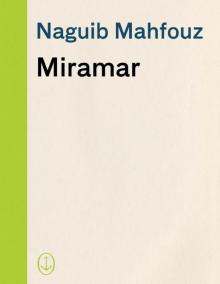 Miramar
Miramar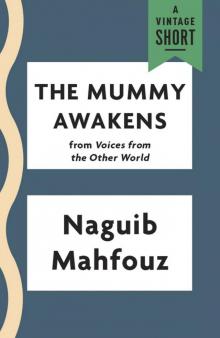 The Mummy Awakens
The Mummy Awakens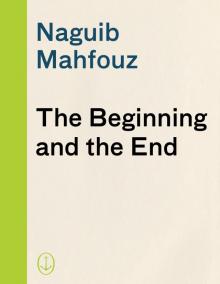 The Beginning and the End
The Beginning and the End Respected Sir, Wedding Song, the Search
Respected Sir, Wedding Song, the Search The Mirage
The Mirage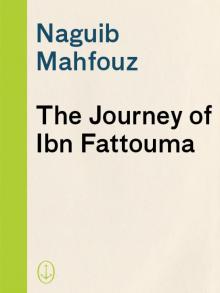 Novels by Naguib Mahfouz
Novels by Naguib Mahfouz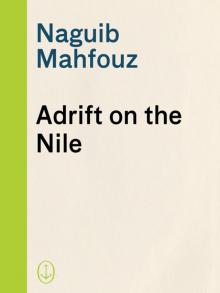 Adrift on the Nile
Adrift on the Nile Karnak Café
Karnak Café Heart of the Night
Heart of the Night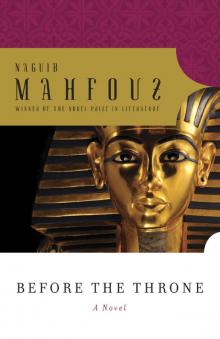 Before the Throne
Before the Throne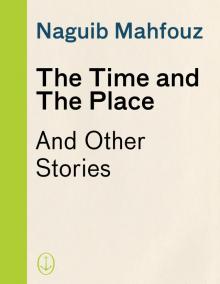 The Time and the Place: And Other Stories
The Time and the Place: And Other Stories Cairo Modern
Cairo Modern Arabian Nights and Days
Arabian Nights and Days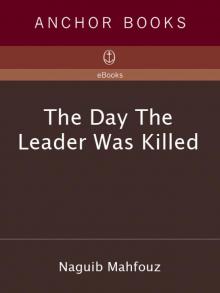 The Day the Leader Was Killed
The Day the Leader Was Killed Morning and Evening Talk
Morning and Evening Talk Three Novels of Ancient Egypt Khufu's Wisdom
Three Novels of Ancient Egypt Khufu's Wisdom Akhenaten: Dweller in Truth
Akhenaten: Dweller in Truth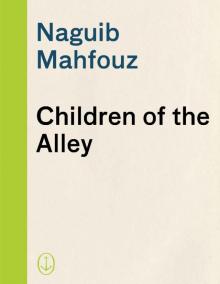 Children of the Alley
Children of the Alley Voices From the Other World
Voices From the Other World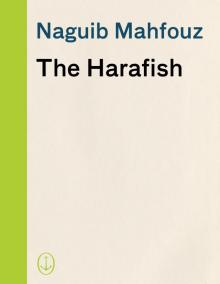 The Harafish
The Harafish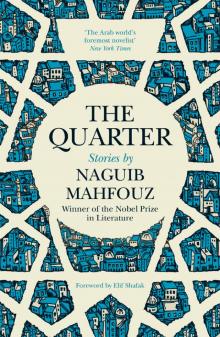 The Quarter
The Quarter The Seventh Heaven: Supernatural Tales
The Seventh Heaven: Supernatural Tales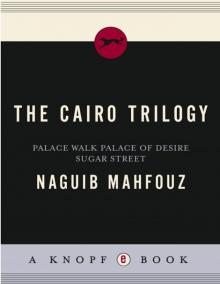 The Cairo Trilogy: Palace Walk, Palace of Desire, Sugar Street
The Cairo Trilogy: Palace Walk, Palace of Desire, Sugar Street Khan Al-Khalili
Khan Al-Khalili Three Novels of Ancient Egypt Khufu's Wisdom, Rhadopis of Nubia, Thebes at War
Three Novels of Ancient Egypt Khufu's Wisdom, Rhadopis of Nubia, Thebes at War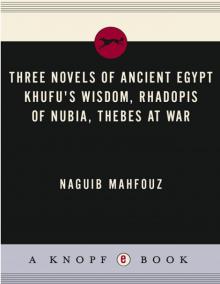 Three Novels of Ancient Egypt
Three Novels of Ancient Egypt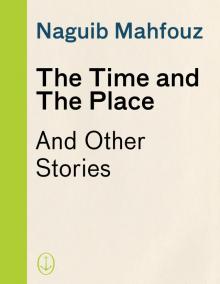 The Time and the Place
The Time and the Place Palace Walk tct-1
Palace Walk tct-1 Akhenaten
Akhenaten The Seventh Heaven
The Seventh Heaven The Thief and the Dogs
The Thief and the Dogs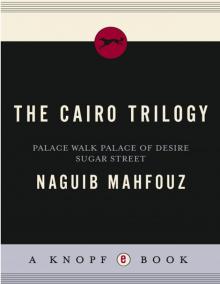 The Cairo Trilogy
The Cairo Trilogy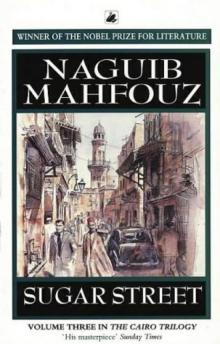 Sugar Street tct-3
Sugar Street tct-3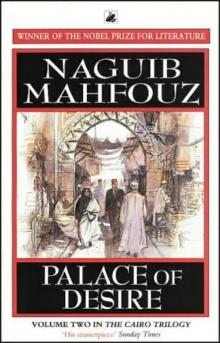 Palace of Desire tct-2
Palace of Desire tct-2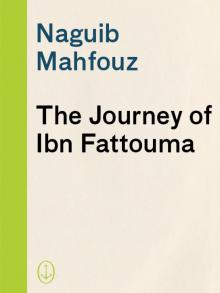 The Journey of Ibn Fattouma
The Journey of Ibn Fattouma